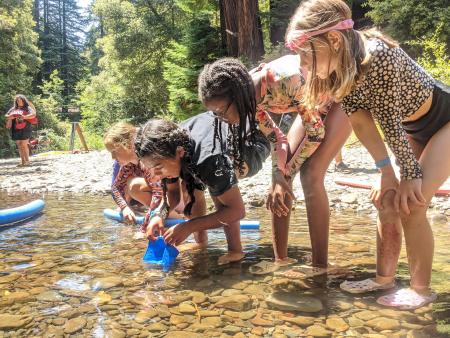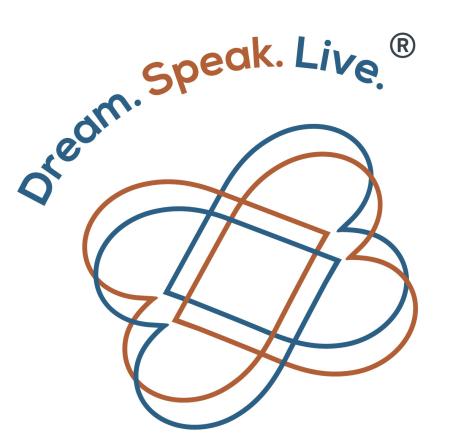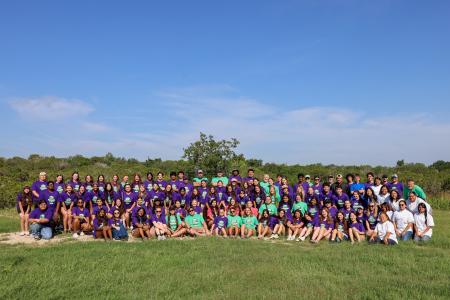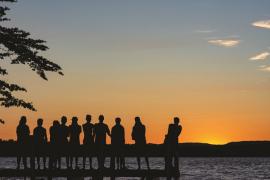Each year, ACA’s Eleanor P. Eells Award for Program Excellence honors camps that embody the spirit of the award’s namesake through their efforts to provide exceptional programming that effectively and innovatively addresses the needs of people and society through the camp experience.
We celebrate the 2025 recipients. They exemplify camp programs that steadfastly strive to equip all campers, regardless of their backgrounds or abilities, with the determination and desire to build brighter futures for themselves and their communities — all while experiencing the joy of camp.

Camp Mendocino (Boys & Girls Clubs of San Francisco)
Since 1931, Boys & Girls Clubs of San Francisco’s Camp Mendocino has been providing a creative, fun, and supportive outdoor education and environmental awareness program focused on character and leadership development for youth ages seven to 17 from disadvantaged circumstances.
“Boys & Girls Clubs of San Francisco’s Camp Mendocino offers youth a rare opportunity to unplug from city life and discover their full potential in a safe, supportive, and nature-filled environment,” said Sara Richardson, camp director. “Surrounded by redwoods and guided by caring staff, campers build confidence, independence, and lasting friendships. This past summer, 1,175 spots were filled over seven sessions.”
Campers spend each day building confidence through hands-on experiences that spark joy, creativity, and personal growth. Some of the camp’s popular programs include high ropes, zipline adventures, swimming and kayaking in the Noyo River, arts and crafts, archery, mountain biking, hiking, nature studies, and performing arts.
“For many, camp becomes a second home — where they begin to imagine a life beyond their daily surroundings, take healthy risks, and discover leadership skills,” Richardson said. “One of camp’s most impactful experiences is the leaders-in-training (LIT) program, and we are excited for it to grow even more in the future. Teens take on real responsibility, serve as role models, and lead younger campers. Through this, they build confidence, develop life- and job-readiness skills, and learn what it means to lead with purpose. For many, becoming a LIT is a turning point — shaping their identities, goals, and future paths.”
Camp Spearhead
Since 1968, Camp Spearhead has followed their mission to create and maintain an environment of unconditional acceptance for children and adults with disabilities and special needs.
“We are very intentional about the carryout of our mission,” said Josh Wall, therapeutics program manager for Greenville County Parks, Recreation, & Tourism. “At the end of our first day of staff training, we have a campfire with our staff and break down our mission word by word.”
According to Wall, that breakdown outlines the following:
- “To create” — what they’re going to do this summer for campers.
- “And maintain” — all the work and love that has been poured into the program in the past.
- “An environment” — the camp’s physical location and weekend activity locations, plus extending to campers’ and staff’s homes and lives outside of camp.
- “Of unconditional acceptance” — care, love, and encouragement no matter what anyone is going through, where they’re from, the color of their skin, what kind of car they pulled up in, etc.
- “For children and adults with disabilities and special needs” — Camp Spearhead accepts all disabilities and special needs and all functional levels, from campers who are highly independent to those who need assistance with all activities of daily living (ADLs).
Campers at Camp Spearhead have ranged from 8 to 92 years old. Any camper is eligible to attend any week of camp or weekend activity, and all activities and programs are designed to be either accessible or adaptable so that each camper can find success.
“Our campers are not put under a microscope like many of them have been under their entire lives,” Wall said. “There is no speech or occupational therapy to complete — they simply get to be JJ with Down syndrome, Liz with cerebral palsy, Drew with autism. This makes the times when major achievements occur — learning to shave, tie shoes, staying overnight away from home for the first time — even more special, because they happen organically, simply because they were put into a place where they were loved and included.”
In 2024, Camp Spearhead launched Spearhead Summer Serve, a counselor-in-training (CIT) program designed to expose high school students to the field of working and interacting with individuals with disabilities. CITs volunteer for two weeks during the summer, acting as an aide and shadow to cabin counselors. Camp Spearhead has seen incredible success in the program so far and hopes to continue to see it grow and become a pipeline for future summer staff — but more importantly, Wall hopes that the program paves the path for a kinder and more inclusive world.

Camp Dream. Speak. Live. Delaware
Camp Dream. Speak. Live. Delaware is an annual weeklong summer camp offered through The Delaware Stuttering Project and Blank Center for Stuttering to children and adolescents who stutter as they navigate their communication challenges. This program uses evidence-based therapy to:
- Increase overall communicative effectiveness
- Improve how participants feel about their ability to communicate
- Increase participant’s positive perception of their ability to establish peer-to-peer relationships
- Enhance leadership skills
- Lessen the influence of stuttering on their overall quality of life
“Camp Dream. Speak. Live. Delaware is innovative in many ways,” said Samuel Farrand, speech language pathologist, research coordinator, and director of the camp. “First, we are a research- and evidence-based therapeutic program that is based on current theoretical and clinical approaches to improving the lives of children who stutter. Second, our program is run primarily by graduate students in the University of Delaware’s Speech-Language Pathology (SLP) master’s program. This use of highly trained graduate clinicians not only provides our campers with expert clinical care, but also provides impactful clinical experience for new clinicians entering the field.”
Every year, Camp Dream. Speak. Live. Delaware increases their number of campers and grows their community investment and support.
“As knowledge of our camp has grown, families from around the country, and even Canada, have visited our camp,” Farrand said. “The collaboration with the team at the Blank Center for Stuttering at UT Austin has continued to be a boon for the Delaware stuttering community, and we hope to continue to nurture the camp program going forward.”

Children’s Association for Maximum Potential Friends of CAMP
Children’s Association for Maximum Potential (CAMP) hosts summer camps and year-round programs designed to strengthen and inspire individuals with medical conditions or disabilities by allowing them to have experiences where they are not defined by their diagnosis.
Following the COVID-19 pandemic, CAMP saw a drop in the number of volunteer staff members they were able to recruit. Their typical recruitment methods — recruiting at schools, job fairs, and service fairs targeting programs where students sought to gain medical experience or earn volunteer hours — no longer produced the same results they had prior to the pandemic. In response, CAMP developed the Friends of CAMP (FoC) program, which strives to recruit the next generation of compassionate leaders who will further the mission of CAMP through service, advocacy, and empowerment.
“The important thing with seasonal staff is that we identify they are people with high character,” said Michael Maffei, camp director. “We trust them to take care of our campers and make decisions independently that align with our core values. If we recognize that we have high-character staff, then why wouldn’t we trust them to recruit for us?”
Friends of CAMP clubs, which are established in high schools and universities across the United States, help support CAMP’s programs by allowing past volunteers to introduce CAMP and its mission to new volunteers.
In the future, Maffei hopes the Friends of Camp program continues to grow, saying, “I’d love to be in 30 schools in a few years’ time.”
Eleanor P. Eells Award for Excellence in Research in Practice
Also given each year since 2015, The Eleanor P. Eells Award for Excellence in Research in Practice honors camp programs that:
- Develop and implement or apply an exemplary research or evaluation project.
- Use research or evaluation findings to improve program practice.
- Develop model research or an evaluation project that can be adapted or replicated.
- Share research or evaluation findings with others.
We salute this year’s winners.

Camp Woodcraft
Founded in 1902 by author and naturalist Ernest Thompson Seton, Camp Woodcraft — a program of Woodcraft Rangers — carries a legacy of fostering inclusion and access to the outdoors. Since launching its scouting and camping programs in Los Angeles in 1922, Woodcraft has championed enriching opportunities for youth at little to no cost.
Camp Woodcraft offers year-round outdoor education, hosts school retreats, and hosts environmental leadership programs that complement academic goals while building teamwork, resilience, and environmental stewardship through hands-on nature exploration. Camp Woodcraft also offers family camp, which extends Woodcraft’s commitment to welcoming participants of all ages, skills, and abilities to share in the magic of camp.
For over a century, Camp Woodcraft operated in picturesque Southern California locations like Lake Arrowhead, Big Bear, and Lake Castaic. Its new permanent home in Big Bear Valley continues this tradition, offering a year-round retreat where participants build confidence, curiosity, and lifelong memories.
“At Camp Woodcraft, quality is not just a standard — it’s a continuous practice,” said Helen Morales, senior director of outdoor education and Camp Woodcraft at Woodcraft Rangers. Every season we review camper, parent, and school partner feedback, conduct staff reflections, and assess outcomes against program goals. We use these insights to refine activities, strengthen staff training, and adapt to the evolving needs of youth and families. Our commitment to inclusivity and safety is reinforced through annual ACA accreditation standards, ongoing professional development, and close collaboration with school and community partners.”
Camp Woodcraft intentionally integrates inclusion practices into outdoor education. Through partnerships with the California Department of Development Services and local regional centers, they’ve built a framework that comprises inclusion specialists, universal design strategies, and individual support pathways.
“Research underpins everything we do,” Morales said. “We draw on studies that demonstrate the academic, social-emotional, and health benefits of time spent in nature — such as the work of Ming Kuo, PhD, and the Children & Nature Network — to design experiences that support both individual growth and school success. Our inclusion framework was informed by research on trauma-informed care, universal design for learning (UDL), and best practices in special education.”
This year, Camp Woodcraft started running their programs year-round, which allows them to carry the impact of camp beyond summer and serve thousands more students each year. In the future, they hope to continue expanding programs to ensure that every child — regardless of income, ability, or background — can access the transformative power of camp.
Camp Boggy Creek
The inspiration behind Camp Boggy Creek started in 1991, when South Florida teenager Jennifer Masi, who was undergoing cancer treatment, wrote the poem “A Dolphin,” for her parents. Her words inspired not only her parents, Nick and Wendy Masi, but also Camp Boggy Creek cofounders actor Paul Newman and General Norman Schwarzkopf. Before Jessica passed away at age 14, she rallied neighbors, community leaders, and her parents to support the idea of building a Central Florida camp that would serve as a respite for other children like her who were facing serious medical illnesses.
Since it first opened in 1996, Camp Boggy Creek has provided free, life-changing camp experiences to more than 95,000 children with serious medical conditions and their families.
Camp Boggy Creek’s Oldest Camper Program, aimed toward youth ages 15 to 17, welcomes campers with diverse medical and behavioral, emotional, and mental health needs. It provides comprehensive support for physical and emotional well-being and integrates the therapeutic recreation elements of challenge, success, discovery, and reflection.
Their programming is informed by their research and evaluation system, which provided key insights into which illness populations warranted further intentional and targeted programming, outreach, and recruitment.
“Through intentional programming, we provide a medically and behaviorally safe camp environment that continuously meets and adapts to meet the evolving needs of the campers we serve,” said James Rujimora, director of behavioral health and wellness at Camp Boggy Creek.
Camp Boggy Creek measures camper outcomes using the Harvard Adolescent Flourishing Measure and the EPOCH Measure of Adolescent Well-being — two evidence-based measures that are developmentally appropriate for their campers’ age range.
In the future, Camp Boggy Creek hopes that the Oldest Camper Program will continue to serve more diverse and underserved camper illness populations at no charge to their families.
Kaley Amonett is the American Camp Association’s editorial communications manager.

